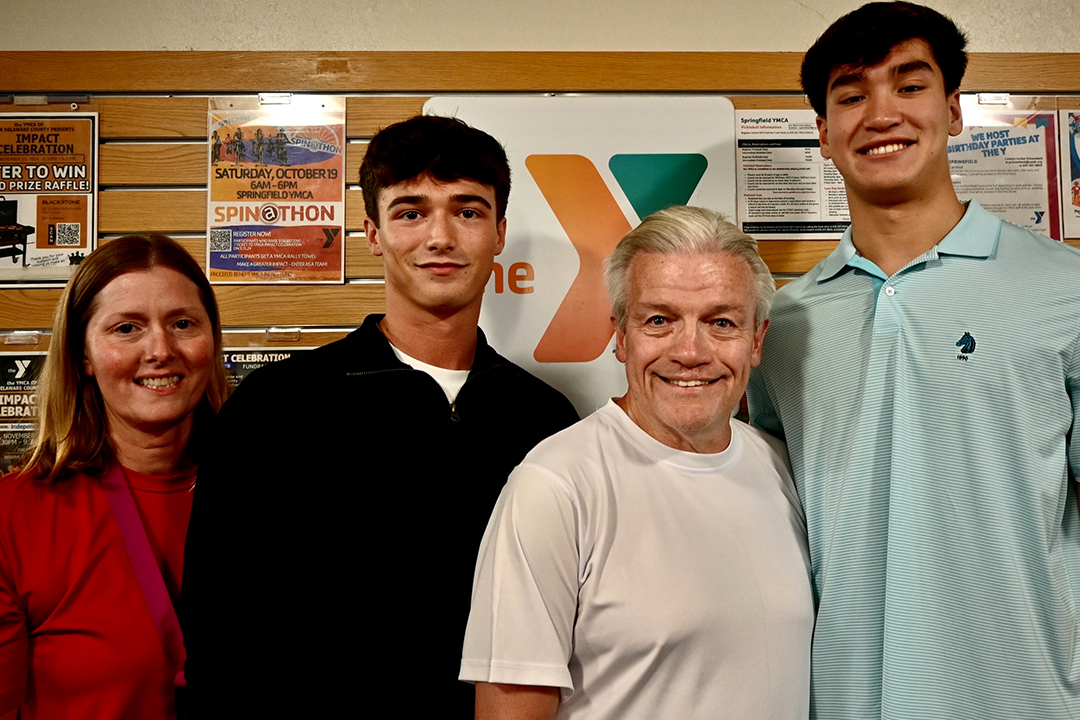
Jim McBride (second from right) stands with Springfield YMCA lifeguards (from left) Carlotta Myers, Peter McMonagle and Gabe DiEmidio who helped save his life when he went into cardiac arrest. Photo by Maxine Mayer / American Red Cross
It was a typical afternoon at the Springfield YMCA when Jim McBride’s life changed in an instant. After swimming laps in the pool, he eased into the hot tub to relax. Moments later, Jim went into sudden cardiac arrest. Fortunately, he wasn’t alone.
YMCA lifeguards — trained in CPR, AED use and first aid — sprang into action. Their quick thinking and American Red Cross training made all the difference.
“If it had happened anywhere else, I would have been gone by the time the ambulance came,” he said.
Jim’s story is not uncommon. The majority of cardiac arrests — more than 70% — occur outside of hospitals. The survival rate is a sobering 10%. But when CPR is started immediately, a person’s chance of survival can double or even triple.
October is Sudden Cardiac Arrest Awareness Month, designed to educate the public about warning signs, risk factors and what to do in a cardiac emergency. The Red Cross encourages everyone to enroll in a CPR and AED course so they can learn how to help someone who goes into cardiac arrest.
Red Cross skills in action
YMCA lifeguard Peter McMonagle had just arrived for his shift when he noticed Jim’s head slipping beneath the water. The high school sophomore had just completed his Red Cross CPR and AED training a few weeks earlier.
Peter pulled Jim out of the water, called for help and started CPR. Fellow lifeguard Gabe DiEmidio – also a newly-trained, high school sophomore – responded. He pressed an emergency button to summon first responders, then immediately retrieved an AED.
“I strapped him up and it said ‘Shock Advised’ so I pressed shock. As soon as I pressed shock he went, (Gabe demonstrated an intake of breath) and then came right back to life. One shock,” he said.
Off-duty lifeguard Carlotta Myers heard the commotion and rushed to help. She cleared Jim’s airway.
“Every employee at the Y is certified in first aid, CPR and the AED,” she said. “So, whether you work on the fitness floor, the front desk, everybody has that training.”
YOUR hands can save a life
Jim knows he was fortunate that Peter, Gabe and Carlotta were nearby. But you don’t need to be a lifeguard or first responder to save someone’s life.
Hatfield resident Matt Decesare was driving through an intersection when he saw a jogger collapse. He pulled over, checked for breathing and called 9-1-1.
While Matt wasn’t certified in CPR, he remembered the importance of doing chest compressions to the beat of Bee Gees’ “Staying Alive.” He performed hands-only CPR – essentially CPR without mouth-to-mouth breaths – for over five minutes until Montgomery Township Police arrived. As a result, the jogger, Tom Pepe, survived.
Unlike Jim and Tom’s experiences, most cardiac arrests don’t happen in public. In fact, more than 70% of non-hospital cardiac arrests happen at home. That’s why it’s so important for everyone to learn CPR and AED skills. The life you save could be your spouse, partner, parent, child or friend.
'Restart a Heart'
On Oct. 16, the American Red Cross will join organizations across the globe to celebrate World Restart a Heart Day – an initiative to raise awareness about sudden cardiac arrest and the importance of learning hands-only CPR.
To mark the occasion, the Red Cross will host a virtual discussion at 4 p.m. called “Real Stories of Cardiac Arrest Survival and the Training that Saves Lives.” Gina Peattie and Dr. Joseph Farrell from the Sudden Cardiac Arrest Foundation will discuss topics such as surviving cardiac arrest and its impact on the entire family. You can stream the live discussion on LinkedIn or Facebook.
Lifesaving skills at your fingertips
Last year, more than 6.6 million people turned to the Red Cross for First Aid, CPR and AED and other lifesaving training. These skills empower everyday people to act with confidence when every second counts. Be ready for the moments that matter by downloading the free Red Cross First Aid app or activating the First Aid Skill for Alexa-enabled devices to access step-by-step emergency guidance.
---------------
- Written by Alana Mauger and Jenny Farley
Support all the urgent humanitarian needs of the American Red Cross.
Find a drive and schedule a blood donation appointment today.
Your time and talent can make a real difference in people’s lives. Discover the role that's right for you and join us today!